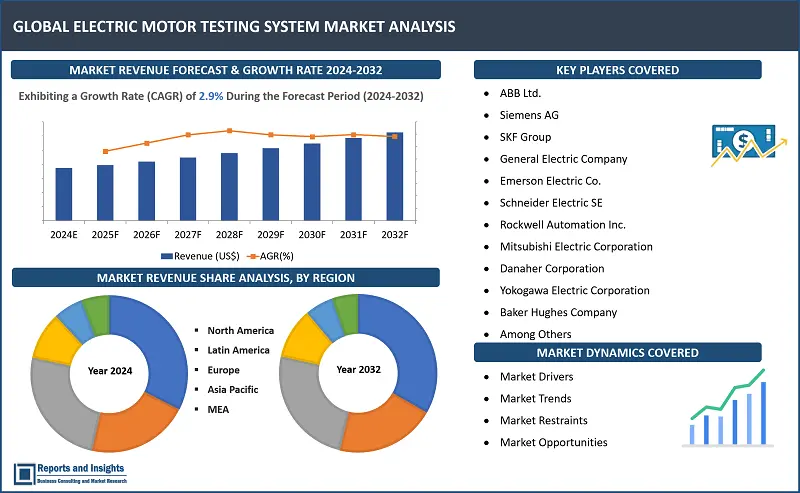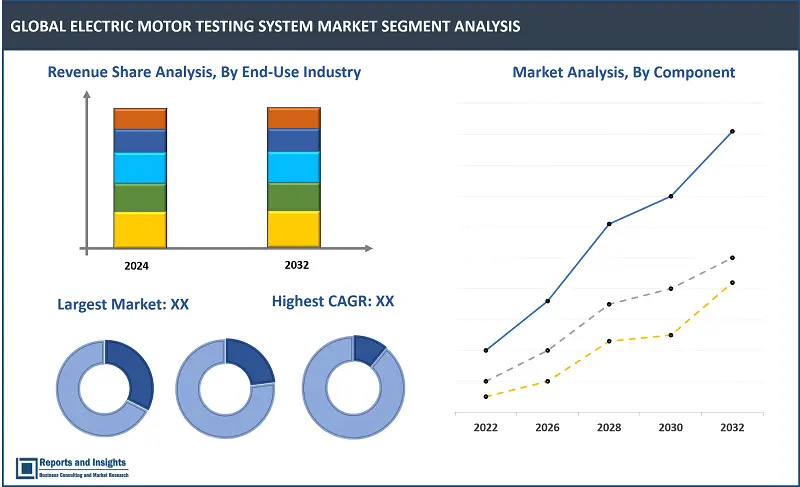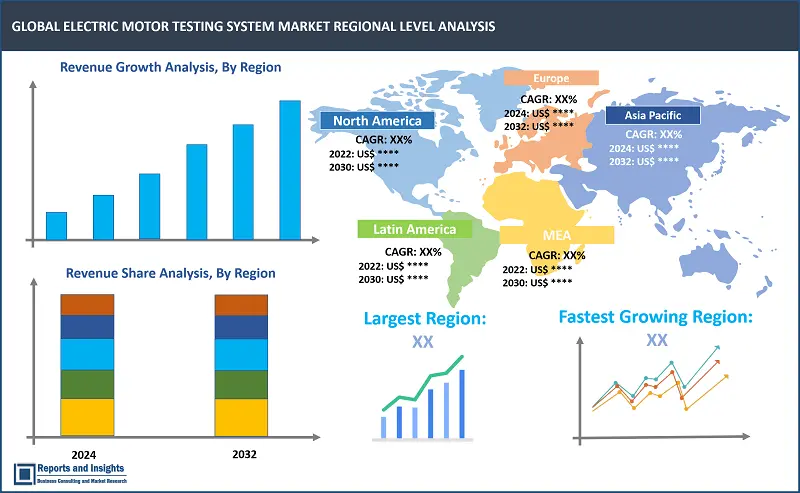Market Overview:
"The global electric motor testing system market size reached US$ 2.6 billion in 2023. Looking forward, Reports and Insights expects the market to reach US$ 3.4 billion in 2032, exhibiting a growth rate (CAGR) of 2.9% during 2024-2032."
|
Report Attributes |
Details |
|
Base Year |
2023 |
|
Forecast Years |
2024-2032 |
|
Historical Years |
2021-2023 |
|
Market Growth Rate (2024-2032) |
2.9% |
Electric motor testing systems are vital in various industries that heavily rely on electric motors, including manufacturing, automotive, aerospace, and power generation. These are used during motor development, production, and regular maintenance processes to ensure compliance with industry standards and regulations, as well as to improve overall efficiency.
Primary function of an electric motor testing system is to assess the performance, efficiency, and health of electric motors. It plays a crucial role in ensuring safe and reliable operation, preventing unexpected breakdowns, and optimizing energy consumption. The system can detect faults, misalignments, and wear by conducting comprehensive tests, such as insulation resistance, vibration analysis, and thermal imaging, allowing for timely maintenance and reducing downtime.
The global electric motor testing system market is registering significant growth due to increasing demand for electric motors across various industries, such as automotive, aerospace, and manufacturing, which is driving the need for efficient testing systems.
In addition, rising emphasis on energy efficiency and stringent regulations regarding motor performance and reliability are driving adoption of electric motor testing systems.
Moreover, advancements in technology, such as integration of automation and data analytics, are enhancing capabilities of testing systems, leading to improved accuracy and productivity. Furthermore, growing focus on predictive maintenance and condition monitoring is creating opportunities for players in the global electric motor testing system market.

Electric Motor Testing System Market Trends and Drivers:
Increasing Adoption of Electric Vehicles: Global shift towards electric vehicles is one of the significant factors driving market revenue growth. Rising demand for electric vehicles, and increasing need for reliable and efficient electric motors, are leading to higher demand for testing systems to ensure enhanced performance and durability.
Emphasis on Energy Efficiency: Energy efficiency has become a key focus across industries, driving demand for electric motors with high efficiency ratings. This electric motor testing market trend is resulting in development of advanced testing systems that can accurately measure motor efficiency and identify areas for improvement, contributing to revenue growth of the market.
Technological Advancements: Continuous technological advancements by players in the electric motor testing system market, including integration of Internet of Things (IoT) and Artificial Intelligence (AI) technologies into testing systems, allowing for real-time monitoring, data analysis, and predictive maintenance to improve the overall efficiency and effectiveness of motor testing processes is expected to drive revenue growth of the market.
Growing Industrial Automation: Increasing adoption of automation in industries such as manufacturing, automotive, and robotics is creating rise in demand for electric motors. This, in turn, is driving the need for robust testing systems to ensure reliability and performance of these motors in automated systems.
Stringent Quality Standards and Regulations: Governments and regulatory bodies are imposing stringent quality standards and regulations on electric motors to ensure safety, reliability, and energy efficiency. Compliance with these standards requires thorough testing and certification, leading to a higher electric motor testing systems market demand.
Electric Motor Testing System Market Restraining Factors:
High Initial Investment: The electric motor testing system market revenue growth could be hampered by high initial investment required to set up testing facilities. Cost of advanced testing equipment and technologies can be substantial, especially for small and medium-sized enterprises, which may deter adoption of comprehensive testing systems.
Lack of Skilled Workforce: Complexity of electric motor testing systems requires skilled technicians and engineers with expertise in motor testing and analysis. However, there is a shortage of qualified professionals in this field, which can limit adoption of advanced testing systems and hamper market revenue growth.
Limited Awareness and Education: Various industries, particularly in developing regions, have limited awareness regarding benefits of electric motor testing systems. Lack of education and understanding about importance of testing and its impact on motor performance and efficiency can hamper market revenue growth.
Challenges in Retrofitting Existing Systems: Retrofitting existing motor systems with testing capabilities can be challenging, especially in older infrastructure and equipment. Cost and complexity of integrating testing systems into existing setups may discourage companies from investing in motor testing, thus limiting product adoption.
Electric Motor Testing System Market Opportunities:
Increasing Emphasis on Energy Efficiency: Growing focus on energy efficient and sustainable systems is creating significant revenue opportunities for players in the electric motor testing system market. Motor testing systems enable accurate performance assessment, fault detection, and efficiency optimization, helping industries comply with energy efficiency standards and reduce operational costs.
Adoption of Industry 4.0 Technologies: Integration of Industry 4.0 technologies, such as IoT and big data analytics, presents opportunities for companies operating in the global electric motor testing system market. These technologies enable real-time monitoring, remote diagnostics, and predictive maintenance of electric motors, improving overall operational efficiency and reducing downtime.
Rising Demand for Electric Vehicles: Increasing adoption of Electric Vehicles (EVs) is creating revenue opportunities for players in the global electric motor testing system market. EV manufacturers require comprehensive testing solutions to ensure reliability, performance, and efficiency of electric motors used in vehicles, thus, driving demand for motor testing systems.
Growing Industrial Automation: Rapid industrial automation across various sectors, including manufacturing, automotive, and robotics, is creating revenue opportunities for players in the global electric motor testing system market. Industries are automating manufacturing processes, which is expected to lead to need for advanced testing systems to ensure optimal performance of electric motors powering automated machinery and equipment.
Growth of Renewable Energy Sector: Growing renewable energy sector, particularly wind and solar power, is creating revenue opportunities for players in the global electric motor testing system market. Motor testing systems are essential for assessing performance and reliability of electric motors used in wind turbines and solar power plants, supporting revenue growth of these renewable energy sources.
Electric Motor Testing System Market Segmentation:

By Component:
- Hardware
- Software
- Services
By Test Type:
- Electrical Testing
- Mechanical Testing
- Thermal Testing
- Others
By End-Use Industry:
- Automotive
- Energy & Power
- Manufacturing
- Oil & Gas
- Aerospace & Defense
- Others
By Region:

- North America
- Latin America
- Asia Pacific
- Europe
- Middle East & Africa
North America market is expected to account for significantly large revenue share in the global market during the forecast period, driven by presence of major industries, including automotive, manufacturing, and aerospace. Stringent quality and safety regulations, drive demand for reliable motor testing systems. In addition, growing adoption of electric vehicles and renewable energy sources is further boosting market revenue growth. Markets in the United States and Canada are key revenue contributors to the market in this region, with a strong focus on technological advancements and sustainable practices.
Europe market is expected to account for substantially large revenue share in the global market during the forecast period. Europe has a well-established industrial sector and a strong emphasis on energy efficiency. Demand for electric motor testing systems is increasing from automotive, energy, and manufacturing sectors. Countries such as Germany, France, and the United Kingdom are major revenue contributors to the market in the region. Also, reducing carbon emissions and increasing share of renewable energy is leading to high adoption of motor testing systems in wind power, solar energy, and electric vehicle applications.
Asia Pacific market is expected to register significantly high revenue growth rate in the global market during the forecast period, due to rapid industrialization and urbanization, leading to increased demand for electric motor testing systems. Countries such as China, Japan, South Korea, and India are major revenue contributors in the market in this region. The automotive and electronics industries drive demand for motor testing systems, while growing investments in renewable energy projects contribute to Asia Pacific market revenue growth. Large population base and increasing middle class customers are also supporting demand for energy-efficient products, further boosting product demand.
Leading Electric Motor Testing System Providers & Competitive Landscape:
The electric motor testing system market is highly competitive, with several prominent players operating globally. These companies focus on continuous innovation, product development, and strategic partnerships to gain a competitive edge. Key players in the market offer a wide range of testing solutions, including motor analyzers, dynamometers, and insulation testers. They also provide comprehensive services such as installation, maintenance, and calibration.
Company List:
- ABB Ltd.
- Siemens AG
- SKF Group
- General Electric Company
- Emerson Electric Co.
- Schneider Electric SE
- Rockwell Automation Inc.
- Mitsubishi Electric Corporation
- Danaher Corporation
- Yokogawa Electric Corporation
- Baker Hughes Company
- Fluke Corporation
- HBM Test and Measurement
- PdMA Corporation
- KONCAR - Electrical Engineering Institute Inc.
Research Scope
|
Report Metric |
Report Details |
|
Market size available for the years |
2021-2032 |
|
Base Year |
2023 |
|
Forecast Period |
2024-2032 |
|
Compound Annual Growth Rate (CAGR) |
2.9% |
|
Segment covered |
Component, Test Type, End-Use Industry, and Region |
|
Regions Covered |
North America: The U.S. & Canada Latin America: Brazil, Mexico, Argentina, & Rest of Latin America Asia Pacific: China, India, Japan, Australia & New Zealand, ASEAN, & Rest of Asia Pacific Europe: Germany, The U.K., France, Spain, Italy, Russia, Poland, BENELUX, NORDIC, & Rest of Europe The Middle East & Africa: Saudi Arabia, United Arab Emirates, South Africa, Egypt, Israel, and Rest of MEA |
|
Fastest Growing Country in Europe |
Germany |
|
Largest Market in Asia Pacific |
China |
|
Key Players |
ABB Ltd., Siemens AG, SKF Group, General Electric Company, Emerson Electric Co., Schneider Electric SE, Rockwell Automation Inc., Mitsubishi Electric Corporation, Danaher Corporation, Yokogawa Electric Corporation, Baker Hughes Company, Fluke Corporation, HBM Test and Measurement, PdMA Corporation, KONCAR - Electrical Engineering Institute Inc., and amongst others. |

